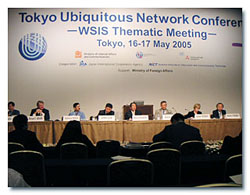国連世界情報社会サミット(World Summit on the Information Society : WSIS)
Report of Tokyo Ubiquitous Network Conference Tokyo from May 16to 17
野村美佐子
(財)日本障害者リハビリテーション協会

The "Tokyo Ubiquitous Network Conference "as the WSIS Thematic Meeting on a Ubiquitous Network Society was held in Tokyo, from 16 to 17 May 2005.
It was organized by the Japanese government, the International Telecommunication Union (ITU) and the United Nations University..
Approximately 600 people from governments, international organizations, the private sector and civil society participated in this conference and all reaffirmed the WSIS Geneva Declaration of Principles and Plan of Actions and discussed specific measures to overcome foreseeable problems in order to establish a ubiquitous Network society where it is possible to connect "anytime, anywhere, by anything and anyone", and make proposals toward the realization of the principles set by the WSIS.
The meeting was started from Opening session with opening address of organizers including Mr. Taro ASO, Minister of Internal Affairs and Communications, Japan , followed by Opening Presentations, Opening Statements, Plenary Session Keynote Speech, and Break-out sessions consisting of the following sessions to give all of participants including experts and representative form governments, the private sector and civil society from around the world an opportunities to share experience, insights and discussions on the possible future development of a ubiquitous network society.
- Technology leading a Ubiquitous Network Society
- Knowledge Sharing-Capacity Building
- Digital Divide
- Ubiquitous Network for Civil Society Designing a People-Centered Inclusive and Development-Oriented Ubiquitous Network Society
- Ubiquitous Network Society
Its detailed information of program can be read at http://www.wsis-japan.jp/program_e.html.
At the Opening Statement, Mr. Monthian Buntan who is President of the Thailand Association of the Blind made a speech, representing Civil Society. He made a powerful presentation, emphasizing concept of "universal design" and the use of "assistive technology" to cerate an inclusive, universally-accessible, partnership and right-based information society for all.
At the session on knowledge sharing-capacity, improving efficiency of capacity building and deployment of distant learning and the impact on such system with the realization of ubiquitous network society, and measures for a sophisticated system with contents capable of sharing knowledge and building capacity were focused through the presentations, .followed by questions and answers, and discussions. In this session it is pointed out that WSIS needs to continue addressing the ICT infrastructure, policy and regulatory readiness, and human capacity building for realizing the benefit of ICTs, and that more sophisticated system of contents development will be needed to take advantage of a ubiquitous network society. The presentation of Dr. Kuzvinesta Peter DZVINMBO who is a rector of African Virtual University was impressive since the participants learned how useful distant-learning system is in Africa in spite of its limited capacity and funding problems. Some of the panelists told that to create a distant learning system accessible for people with disability was a big challenge and would like to work together with people working for those people.
At the session on ubiquitous network for civil society, the topics such as ensuing access for all, human right including privacy protection. Ethics and social responsibility, role of education in ubiquitous network society, and the roadmap for the ideal ubiquitous network society were discussed. Some of the presentations are made by people who are very active in civil society activities in the WSIS such as Ms. Karen Banks, Ms Divina Frau-meigs, and Hiroshi Kawamrua. Mr. Kawamura as disability focal point made a presentation on affordable ICT Development with Universal Design concept and Assistive Technologies. He introduced disability caucus activities and the Global Forum on Disabilities in Tunis to be held in Tunis during the Second phase WSIS. In his presentation he emphasized equal digital opportunities for persons with disabilities by universal design and the use of assistive technology and equal participation of persons with disabilities for human centered inclusive democratic ubiquitous society. This session concluded that civil society is an equal partner in shaping a ubiquitous society from design to implementation, including monitoring and evaluation, and that a ubiquitous network society must do the following things.
- Be development-oriented, ensuring equitable and sustainable distribution of resources
- Recognize the goal of accessibility for all, emphasizing the needs of people with disabilities and the poor
- Respect the Internet end-to-end principles and open source, open content, open courseware, and open standards
- Uphold human rights, rights to self-determination, and particularly the risks to privacy, for example from the leakage of personal information
At the Session on ubiquitous net work society, discussion on "toward the design and realization of ubiquitous network society was held. Governance of ubiquitous network society was discussed. This session concluded that the governance of a Ubiquitous Network Society will incorporate cooperation among all stakeholders including governments, international organizations, the private sector and civil society at local, national, regional and international levels. The participants all agreed that all stakeholders need to work together with common awareness about ubiquitous network society. Mr. Izumi Aizu who is Deputy Director of Hyper Network Society and coordinated civil society session pointed out three big risks of excluding Netizens (Net citizen ) such as techno-centered, cooperate-centered, and bureaucracy which people have to realize. http://www.wsis-japan.jp/doc_pdf/S5-1Aizu_final.pdf
At the end of the conference, the chairman’s report was discussed and finalized.
